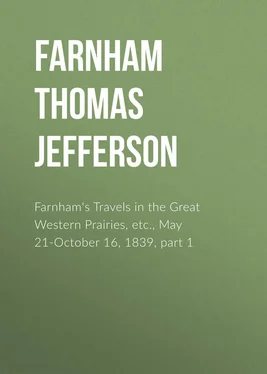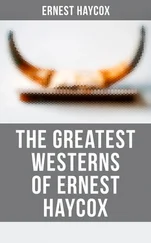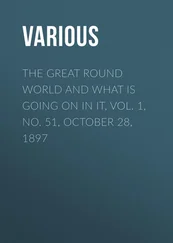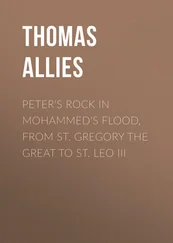Thomas Farnham - Farnham's Travels in the Great Western Prairies, etc., May 21-October 16, 1839, part 1
Здесь есть возможность читать онлайн «Thomas Farnham - Farnham's Travels in the Great Western Prairies, etc., May 21-October 16, 1839, part 1» — ознакомительный отрывок электронной книги совершенно бесплатно, а после прочтения отрывка купить полную версию. В некоторых случаях можно слушать аудио, скачать через торрент в формате fb2 и присутствует краткое содержание. Издательство: Иностранный паблик, Жанр: foreign_antique, foreign_prose, Путешествия и география, на английском языке. Описание произведения, (предисловие) а так же отзывы посетителей доступны на портале библиотеки ЛибКат.
- Название:Farnham's Travels in the Great Western Prairies, etc., May 21-October 16, 1839, part 1
- Автор:
- Издательство:Иностранный паблик
- Жанр:
- Год:неизвестен
- ISBN:нет данных
- Рейтинг книги:3 / 5. Голосов: 1
-
Избранное:Добавить в избранное
- Отзывы:
-
Ваша оценка:
- 60
- 1
- 2
- 3
- 4
- 5
Farnham's Travels in the Great Western Prairies, etc., May 21-October 16, 1839, part 1: краткое содержание, описание и аннотация
Предлагаем к чтению аннотацию, описание, краткое содержание или предисловие (зависит от того, что написал сам автор книги «Farnham's Travels in the Great Western Prairies, etc., May 21-October 16, 1839, part 1»). Если вы не нашли необходимую информацию о книге — напишите в комментариях, мы постараемся отыскать её.
Farnham's Travels in the Great Western Prairies, etc., May 21-October 16, 1839, part 1 — читать онлайн ознакомительный отрывок
Ниже представлен текст книги, разбитый по страницам. Система сохранения места последней прочитанной страницы, позволяет с удобством читать онлайн бесплатно книгу «Farnham's Travels in the Great Western Prairies, etc., May 21-October 16, 1839, part 1», без необходимости каждый раз заново искать на чём Вы остановились. Поставьте закладку, и сможете в любой момент перейти на страницу, на которой закончили чтение.
Интервал:
Закладка:
The following morning was clear and pleasant, and we were early on our route. We crossed the stream called Big Blue, a tributary of the Missouri, 31 31 For this stream see James's Long's Expedition , in our volume xiv, p. 184, note 153. – Ed.
about twelve o'clock, and approached the border of the Indian domains. All were anxious now to see and linger over every object which reminded us we were still on the confines of that civilization which we had inherited from a thousand generations; a vast and imperishable legacy of civil and social happiness. It was, therefore, painful to approach the last frontier enclosure – the last habitation of the white man – the last semblance of home. At length the last cabin was approached. We drank at the well and travelled on. It was now behind us. All, indeed was behind us with which the sympathies of our young days had mingled their holy memories. Before us were the treeless plains of green, as they had been since the flood – beautiful, unbroken by bush or rock; unsoiled by plough or spade; sweetly scented with the first blossomings of the spring. They had been, since time commenced, the theatre of the Indian's prowess – of his hopes, joys, and sorrows. Here, nations, as the eve of deadly battle closed around them, had knelt and raised the votive offering to Heaven, and implored the favour and protection of the Great Spirit who had fostered their fathers upon the wintry mountains of the North, and when bravely dying, had borne them to the islands of light beneath the setting sun. A lovely landscape this, for an Indian's meditation! He could almost behold in the distance where the plain and sky met, the holy portals of his after-state so mazy and beautiful was the scene!
Having travelled about twenty-five miles over this beautiful prairie, we halted on the banks of a small stream at a place called Elm Grove. 32 32 This is probably the same as Round Grove, for which see Gregg's Commerce of the Prairies , in our volume xix, p. 193, note 35. – Ed.
Here we pitched our tent, tied our horses to stakes, carried for that purpose, and after considerable difficulty having obtained fuel for a fire, cooked and ate for the first time in the Indian Territory.
At this encampment final arrangements were made for our journey over the Prairies. To this end provisions, arms, ammunition, packs and pack-saddles, were overhauled, and an account taken of our common stock of goods for trade with the Indians. The result of this examination was, that we determined to remain here a while, and send back to the Kauzaus Indian mill for two hundred pounds of flour. We were induced to take this step by assurances received from certain traders whom we met coming from the mountains, that the buffalo had not advanced so far north as to furnish us with their fine hump-ribs so early by a week or fortnight as we had expected. Officers were also chosen and their powers defined; and whatever leisure we found from these duties during a stay of two days, was spent in regaling ourselves with strawberries and gooseberries, which grew in great abundance near our camp.
Our friends having returned from the mill with the flour for which they had been despatched, we left Elm Grove on the 3rd of June, travelled along the Santa Fé trail about fifteen miles, and encamped upon a high knoll, from which we had an extensive view of the surrounding plains. The grass was now about four inches in height, and bent and rose in most sprightly beauty under the gusts of wind which at intervals swept over it. We remained here a day and a half, waiting for two of our number who had gone in search of a horse that had left our encampment at Elm Grove. The time, however, passed agreeably. We were, indeed, beyond the sanctuaries of society, and severed from the kind pulsations of friendship; but the spirit of the Red Man, wild and careless as the storms he buffets, began to come over us; and we shouldered our rifles and galloped away for a deer in the lines of timber that threaded the western horizon. Our first hunt in the depths of the beautiful and dreadful wilderness! It was attended with no success, however, but was worth the effort. We had begun to hunt our food.
In the afternoon of the 4th, our friends returned with the strayed animals. The keepers immediately fired the signalguns, and all were soon in camp. Our road on the 5th was through a rich, level prairie, clothed with the wild grass common to the plains of the West. A skirt of black oak timber occasionally lined the horizon or strayed up a deep ravine near the trail. The extreme care of the pioneers in the overland Santa Fé trade was every where noticeable, in the fact that the track of their richly-loaded waggons never approached within musket-shot of these points of timber. Fifteen miles' march brought us to our place of encampment. A certain portion of the company allotted to that labour, unpacked the company's mules of the common-stock property, provisions, ammunitions, &c.; another portion pitched the tent; another gathered wood and kindled a fire; whilst others brought water, and still others again put seething-pots and frying-pans to their appropriate duties. So that at this, as at many a time before and after, a few minutes transposed our little cavalcade from a moving troop into an eating, drinking, and joyous camp. A thunder-storm visited us during the night. The lightning was intensely vivid, and the explosions were singularly frequent and loud. The sides of the heavens appeared to war like contending batteries in deadly conflict. The rain came in floods; and our tent, not being ditched around, was flooded soon after the commencement of the storm, and ourselves and baggage thoroughly drenched.
The next day we made about fifteen miles through the mud and rain, and stopped for the night near a solitary tree upon the bank of a small tributary of the Konzas river. Here fortune favoured our fast decreasing larder. One of the company killed a turtle, which furnished us all with an excellent supper. This was the only description of game that we had seen since leaving the frontier.
On the 7th, as the sun was setting, we reached Osage River – a stream which flows into the Missouri below Jefferson City. The point where we struck it, was one hundred miles south-west of Independence. 33 33 The Osage rises in Kansas south of Kansas River, and as Farnham states, flows in a general easterly course into the Missouri. The usual camping place on the Santa Fé trail was about a hundred miles out, on what was called One Hundred and Ten Mile Creek, indicative of its distance from Fort Osage. – Ed.
We pitched our tent snugly by a copse of wood within a few yards of it; staked down our animals near at hand, and prepared, and ate in the usual form, our evening repast. Our company was divided into two messes, seven in one, and eight in the other. On the ground, each with a tin pint cup and a small round plate of the same material, the first filled with coffee, tea, or water, the last with fried bacon and dough fried in fat; each with a butcher-knife in hand, and each mess sitting, tailor-like, around its own frying-pan, eating with the appetite of tigers formed the coup-d'œil of our company at supper on the banks of the Osage.
Near us were encamped some waggoners on their return to Missouri, who had been out to Council Grove with the provisions and that part of the goods of the Santa Fé traders which the teams of untrained mules had been unable to draw when they left Independence. With these men we passed a very agreeable evening; they amused us with yarns of mountain-life, which from time to time had floated in, and formed the fireside legends of that wild border. In the morning, while we were saddling our animals, two of the Kauzaus Indians came within a few rods of our camp, 34 34 For the Kansa, see Bradbury's Travels , in our volume v, p. 67, note 37. – Ed.
and waited for an invitation to approach. They were armed with muskets and knives. The manner of carrying their fire-arms was peculiar, and strongly characteristic of Indian caution. The breech was held in the right hand, and the barrel rested on the left arm; thus they are always prepared to fire. They watched us narrowly, as if to ascertain whether we were friends or foes, and upon our making signs to them to approach, they took seats near the fire, and with most imperturbable calmness, commenced smoking the compound of willow-bark and tobacco with which they are wont to regale themselves. When we left the ground, one of the men threw away a pair of old boots, the soles of which were fastened with iron nails. Our savage visitors seized upon them with the greatest eagerness, and in their pantomimic language, aided by harsh, guttural grunts, congratulated themselves upon becoming the possessors of so much wealth. At eight o'clock we were on march.
Интервал:
Закладка:
Похожие книги на «Farnham's Travels in the Great Western Prairies, etc., May 21-October 16, 1839, part 1»
Представляем Вашему вниманию похожие книги на «Farnham's Travels in the Great Western Prairies, etc., May 21-October 16, 1839, part 1» списком для выбора. Мы отобрали схожую по названию и смыслу литературу в надежде предоставить читателям больше вариантов отыскать новые, интересные, ещё непрочитанные произведения.
Обсуждение, отзывы о книге «Farnham's Travels in the Great Western Prairies, etc., May 21-October 16, 1839, part 1» и просто собственные мнения читателей. Оставьте ваши комментарии, напишите, что Вы думаете о произведении, его смысле или главных героях. Укажите что конкретно понравилось, а что нет, и почему Вы так считаете.












